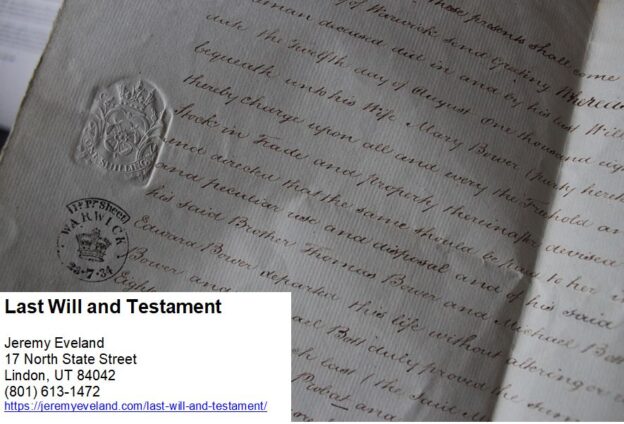In this article, you will learn about the importance of consulting a Last Will and Testament lawyer. This legal professional specializes in helping individuals create a comprehensive and legally binding document that outlines their final wishes. By seeking the guidance of a knowledgeable lawyer, you can ensure that your assets are distributed according to your desires, protecting your loved ones and minimizing potential conflicts.
A Last Will and Testament lawyer can provide invaluable insight into the complexities of estate planning. They can assist you in identifying and addressing any potential issues that may arise when it comes to distributing your assets. Whether you have a large estate or a modest one, consulting a lawyer can help you navigate through the legal requirements and formalities involved in creating a valid and enforceable will. With their expertise, you can obtain peace of mind knowing that your final wishes will be respected and your loved ones will be taken care of after you pass away. If you have specific questions or concerns about your will, contact a Last Will and Testament lawyer to schedule a consultation and protect the future of your estate.
Last Will And Testament Lawyer
What is a Last Will and Testament?
Definition of a Last Will and Testament
A Last Will and Testament, commonly referred to as a will, is a legal document that outlines how a person’s assets and properties will be distributed after their death. It allows individuals to determine who will inherit their assets and appoint an executor to carry out their wishes. A will also typically includes provisions for the care of minor children, funeral arrangements, and other important instructions.
Importance of having a Last Will and Testament
Having a Last Will and Testament is crucial, regardless of age or financial status. Without a will, the distribution of assets will be subject to the laws of intestacy, which vary from state to state. This can result in assets being distributed in a way that does not align with the deceased person’s wishes. By having a will in place, you can ensure that your assets are distributed according to your preferences and provide clarity and peace of mind for your loved ones during an already difficult time.
When is a Last Will and Testament required?
Determining the need for a Last Will and Testament
While a Last Will and Testament is not legally required, it is highly recommended for anyone who owns assets, has dependents, or wishes to have control over the distribution of their estate. Regardless of age or financial status, it is important to have a will to ensure that your wishes are carried out and your loved ones are taken care of after your passing.
Common situations where a Last Will and Testament is necessary
There are several situations where having a Last Will and Testament becomes particularly important. These include:
-
Minor children: If you have minor children, a will allows you to designate a guardian who will be responsible for their care in the event of your death. This ensures that your children are placed in the hands of someone you trust.
-
Specific asset distribution: If you have particular assets that you wish to distribute to specific individuals or organizations, a will allows you to outline these instructions clearly. Without a will, these specific wishes may not be honored.
-
Blended families: If you have a blended family, a will can help prevent potential conflicts among family members by clearly defining how assets should be distributed to ensure the well-being of all parties involved.
-
Charitable giving: If you wish to donate a portion or all of your assets to charitable organizations, a will allows you to specify the amount or percentage you would like to contribute.
Choosing a Last Will and Testament Lawyer
Qualities to look for in a Last Will and Testament Lawyer
When selecting a Last Will and Testament lawyer, it is essential to choose someone who possesses the necessary qualities and expertise to handle your specific needs. Some qualities to look for in a lawyer include:
-
Experience: Seek a lawyer who specializes in estate planning and has extensive experience in drafting wills. Their knowledge and expertise will ensure that your will is legally valid and tailored to your unique circumstances.
-
Professionalism: Look for a lawyer who demonstrates professionalism, integrity, and clear communication skills. Your lawyer should be able to explain complex legal concepts in a way that you can understand, and be responsive to your questions and concerns throughout the process.
-
Attention to detail: A Last Will and Testament is a legally binding document that must be carefully drafted and executed. A good lawyer will pay close attention to every detail to ensure that your wishes are accurately reflected in the document.
Considerations when selecting a Last Will and Testament Lawyer
In addition to the qualities mentioned above, there are a few considerations to keep in mind when selecting a Last Will and Testament lawyer:
-
Reputation and reviews: Research the lawyer’s reputation and read reviews from past clients. This will give you insight into their track record and the level of satisfaction their clients have experienced.
-
Fees and costs: Inquire about the lawyer’s fee structure and any additional costs associated with drafting a Last Will and Testament. Make sure you have a clear understanding of the financial implications before moving forward.
Understanding the Legal Process
Steps involved in creating a Last Will and Testament
Creating a Last Will and Testament involves several important steps, including:
-
Consultation: The process typically begins with an initial consultation with a Last Will and Testament lawyer. During this meeting, you will discuss your wishes, assets, and any concerns or questions you may have.
-
Drafting and review: The lawyer will then prepare a draft of your Last Will and Testament based on the information gathered during the consultation. It is crucial to carefully review the draft to ensure that all your wishes are accurately reflected.
-
Execution and witnessing: Once the final version of the document is approved, it must be signed in the presence of witnesses. The requirements for witnesses may vary depending on the jurisdiction, so it is important to follow the legal procedures applicable in your area.
Role of a Last Will and Testament Lawyer during the process
A Last Will and Testament lawyer plays a crucial role in guiding you through the legal process of creating a will. They will provide valuable advice, ensure compliance with legal requirements, and help you navigate complex legal terminology. Their expertise will help ensure that your will is legally valid and that your intentions are clearly stated.
Drafting a Last Will and Testament
Key elements to include in a Last Will and Testament
When drafting a Last Will and Testament, there are several key elements that should be included to ensure clarity and validity. These include:
-
Personal information: Start by clearly identifying yourself, including your full name, address, and date of birth.
-
Executor appointment: Designate an executor who will be responsible for carrying out the instructions outlined in your will. This person should be someone you trust and who is willing to take on this responsibility.
-
Asset distribution: Clearly specify how you wish to distribute your assets. It is essential to be as detailed and specific as possible to avoid any potential confusion or disputes among beneficiaries.
-
Guardianship provisions: If you have minor children, include provisions for appointing a guardian who will be responsible for their care.
Avoiding common mistakes in drafting a Last Will and Testament
Drafting a Last Will and Testament can be a complex process, and it is important to avoid common mistakes that can render your will invalid or cause unintended consequences. Some common mistakes to avoid include:
-
Not updating the will: Circumstances and relationships change over time. It is crucial to periodically review and update your will to reflect any changes in your life, such as births, deaths, marriages, or divorces.
-
Not considering tax implications: Failing to consider tax implications can have significant consequences for your beneficiaries. Consulting with a tax professional or estate planning lawyer can help ensure that your estate is structured in a tax-efficient manner.
Reviewing and Updating a Last Will and Testament
When to review and update a Last Will and Testament
It is important to review and update your Last Will and Testament periodically, as circumstances and relationships change. It is recommended to review your will at least every three to five years, or whenever a major life event occurs. Some common triggers for reviewing and updating your will include:
-
Marriage or divorce: Changes in marital status can have a significant impact on your estate planning. Updating your will ensures that it reflects your current wishes and takes into account any new relationships.
-
Birth or adoption: The addition of a new child or dependant may require updating your will to include provisions for their care and inheritance.
-
Change in financial circumstances: If there has been a significant change in your financial situation, such as an inheritance or the acquisition or sale of assets, it may be necessary to revise your will to reflect these changes.
Importance of regular reviews and updates
Regularly reviewing and updating your Last Will and Testament is essential to ensure that your wishes are accurately reflected and that your beneficiaries are taken care of. Failing to update your will can result in unintended consequences and potential disputes among family members. By keeping your will up to date, you can have peace of mind knowing that your wishes will be carried out as intended.
Administering an Estate
Duties and responsibilities of an executor
The executor of a Last Will and Testament plays a vital role in the administration of an estate. Some of the key duties and responsibilities of an executor include:
-
Probate application: The executor is responsible for filing the necessary paperwork with the court to initiate the probate process.
-
Asset inventory and valuation: The executor must identify and gather all the assets of the deceased, including property, bank accounts, investments, and personal belongings. They may also need to arrange for professional appraisals to determine the value of certain assets.
-
Debts and taxes: The executor is responsible for paying off any debts and taxes owed by the deceased from the assets of the estate.
Role of a Last Will and Testament Lawyer in administering an estate
A Last Will and Testament lawyer can provide invaluable assistance to an executor in administering an estate. They can help navigate the complex legal procedures involved in probate, provide guidance on asset valuation, and ensure that the executor fulfills their duties and responsibilities in accordance with the law. In cases where disputes arise among beneficiaries, a lawyer can also provide representation and guidance to protect the interests of the estate.
Contesting a Last Will and Testament
Grounds for contesting a Last Will and Testament
While rare, there are instances where a Last Will and Testament may be contested. Grounds for contesting a will may include:
-
Lack of capacity: If it can be proven that the deceased did not have the mental capacity to understand the consequences of their actions when creating the will, it may be deemed invalid.
-
Undue influence: If it can be demonstrated that the deceased was coerced or unduly influenced by another person when creating the will, it may be challenged on these grounds.
-
Forgery or fraud: If the will is suspected to be a forgery or the result of fraudulent activities, it can be contested in court.
Legal process for challenging a Last Will and Testament
Challenging a Last Will and Testament involves a legal process that should be navigated with the assistance of a qualified lawyer. The process typically involves:
-
Filing a claim: The party contesting the will must file a claim with the appropriate court, outlining the grounds for contesting the will.
-
Evidence gathering: The contesting party must gather and present evidence to support their claim, such as medical records, witness testimony, or expert opinions.
-
Court proceedings: The court will review the evidence presented by both parties and make a decision on the validity of the will.
Protecting Your Last Will and Testament
Safeguarding the confidentiality of your Last Will and Testament
Maintaining the confidentiality of your Last Will and Testament is of utmost importance. To protect the confidentiality of your will, consider the following steps:
-
Store your will securely: Keep the original copy of your will in a safe and secure location, such as a safe deposit box or with a trusted individual, and provide instructions to your executor and loved ones on how to access it.
-
Limit distribution: Share information about your will only with trusted individuals who have a legitimate need to know, such as your executor or lawyer.
Taking precautions to prevent tampering or fraud
To prevent tampering or fraud, consider taking the following precautions:
-
Use a lawyer: Have your Last Will and Testament drafted by a qualified lawyer who can ensure the document is legally valid and free from potential vulnerabilities.
-
Executor notification: Inform your chosen executor about their role and responsibilities, and provide them with a copy of your Last Will and Testament. This will ensure that they are aware of their duties and can act promptly and efficiently.
Conclusion
Having a Last Will and Testament is a vital component of every individual’s estate planning. It allows you to have control over the distribution of your assets, appoint a guardian for minor children, and outline your final wishes. To ensure that your will is legally valid and tailored to your unique circumstances, it is crucial to seek the guidance of a qualified Last Will and Testament lawyer. They will provide you with the necessary expertise and assistance throughout the drafting, updating, and administration of your will, ensuring that your wishes are carried out and providing peace of mind for you and your loved ones.
Areas We Serve
We serve individuals and businesses in the following locations:
Salt Lake City Utah
West Valley City Utah
Provo Utah
West Jordan Utah
Orem Utah
Sandy Utah
Ogden Utah
St. George Utah
Layton Utah
South Jordan Utah
Lehi Utah
Millcreek Utah
Taylorsville Utah
Logan Utah
Murray Utah
Draper Utah
Bountiful Utah
Riverton Utah
Herriman Utah
Spanish Fork Utah
Roy Utah
Pleasant Grove Utah
Kearns Utah
Tooele Utah
Cottonwood Heights Utah
Midvale Utah
Springville Utah
Eagle Mountain Utah
Cedar City Utah
Kaysville Utah
Clearfield Utah
Holladay Utah
American Fork Utah
Syracuse Utah
Saratoga Springs Utah
Magna Utah
Washington Utah
South Salt Lake Utah
Farmington Utah
Clinton Utah
North Salt Lake Utah
Payson Utah
North Ogden Utah
Brigham City Utah
Highland Utah
Centerville Utah
Hurricane Utah
South Ogden Utah
Heber Utah
West Haven Utah
Bluffdale Utah
Santaquin Utah
Smithfield Utah
Woods Cross Utah
Grantsville Utah
Lindon Utah
North Logan Utah
West Point Utah
Vernal Utah
Alpine Utah
Cedar Hills Utah
Pleasant View Utah
Mapleton Utah
Stansbury Par Utah
Washington Terrace Utah
Riverdale Utah
Hooper Utah
Tremonton Utah
Ivins Utah
Park City Utah
Price Utah
Hyrum Utah
Summit Park Utah
Salem Utah
Richfield Utah
Santa Clara Utah
Providence Utah
South Weber Utah
Vineyard Utah
Ephraim Utah
Roosevelt Utah
Farr West Utah
Plain City Utah
Nibley Utah
Enoch Utah
Harrisville Utah
Snyderville Utah
Fruit Heights Utah
Nephi Utah
White City Utah
West Bountiful Utah
Sunset Utah
Moab Utah
Midway Utah
Perry Utah
Kanab Utah
Hyde Park Utah
Silver Summit Utah
La Verkin Utah
Morgan Utah
Attorney for Wills and Trusts Consultation
When you need help from a probate and will lawyer in Utah, call Jeremy D. Eveland, MBA, JD (801) 613-1472 for a consultation.
Jeremy Eveland
17 North State Street
Lindon UT 84042
(801) 613-1472
Related Posts
Business Lawyer American Fork Utah
How To Handle Customer Complaints In Utah
Business Lawyer Saratoga Springs Utah
The Role of Business Law in Protecting Minority Shareholder Rights
What Are The 4 Different Types of Business Law?
Business Lawyer Washington Utah
Business Lawyer South Salt Lake Utah
Legal Requirements for Utah Technology Startups
Business Lawyer Farmington Utah
Due Diligence For Buying A Utah Business
Understanding Utah’s Labor Laws
Business Lawyer North Salt Lake Utah
Product Liability Laws in Utah
Preventing Cybersecurity Breaches
Business Lawyer North Ogden Utah
Business Lawyer Brigham City Utah
Mastering Business Law: Key Essentials For Success
Business Lawyer Centerville Utah
Shareholder Agreements in Utah
Business Lawyer Hurricane Utah






